
Marking the New Year, Tamil Guardian takes a look back on the major events in the Tamil homeland, in Sri Lanka and across the diaspora over the last year.
Throughout the year Sri Lanka continued to grapple with its dire economic crisis whilst maintaining an approach of brutal suppressing. The year has witnessed both the ascendency of Anura Kumara Dissanayake, viewed as a political outsider, through the presidential, and subsequent, parliamentary elections as well as the downfall of “establishment” Tamil political parties.
In spite of the tumultuous times, Eelam Tamils remain steadfast in their demands for justice and accountability for the Tamil genocide, demilitarisation of the homeland, to know the fate of those forcibly disappeared and the right to self-determination.
January
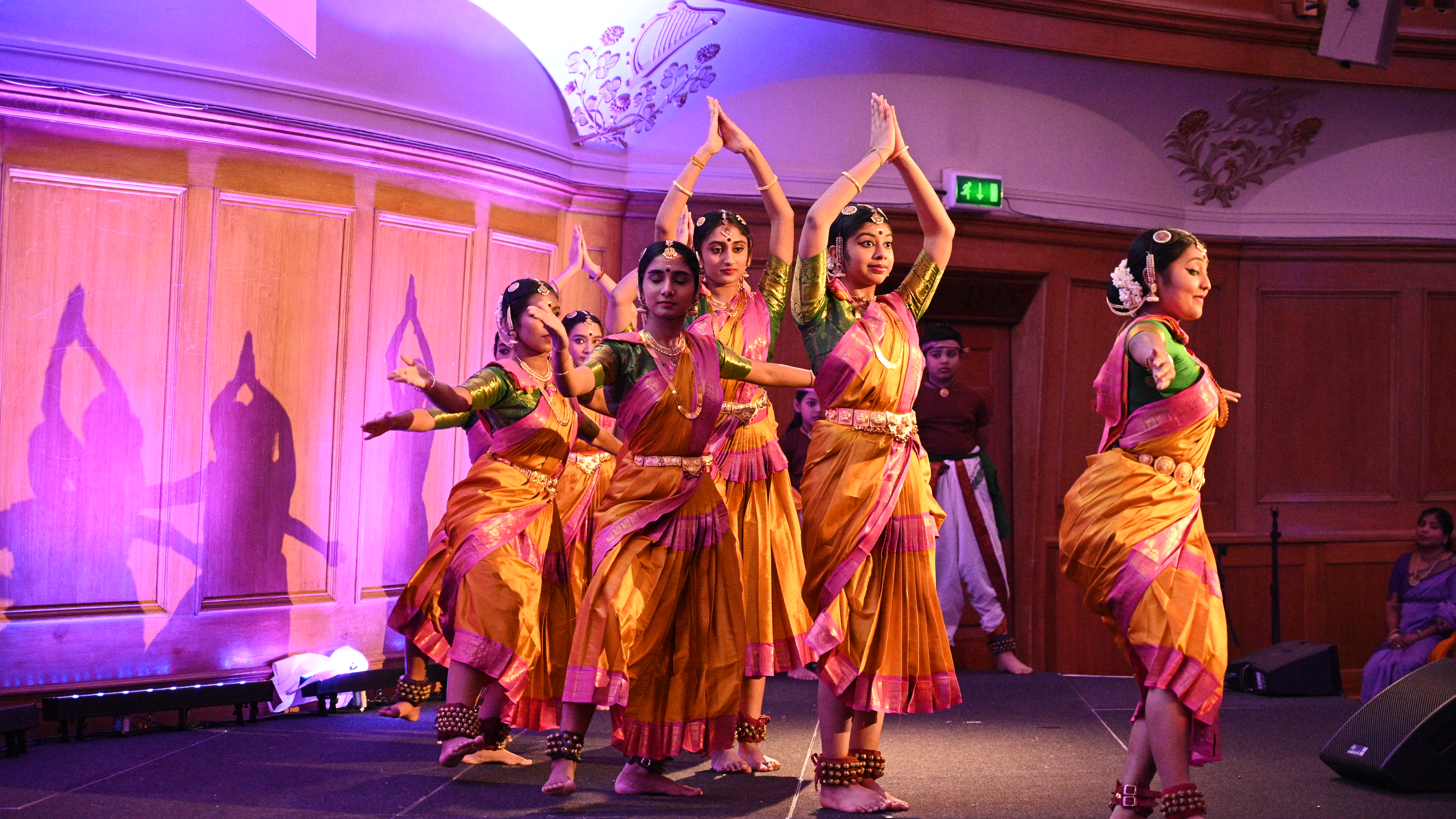
Read more here: Pongal in Westminster - British Tamils celebrate Thai Pongal
The year also kicked off with the forceful detainment and arrest of Sivanathan Jenita, the leader of Vavuniya’s Association of Relatives of the Enforced disappeared. Jenita and other Tamil relatives of the disappeared were protesting against former president Ranil Wickremesinghe’s visit to Vavuniya where they were met with force by the Sri Lankan police. The arrests sparked protests in the North-East demanding her release. Although Jenita was later released on bail, she and other activists have continued to face surveillance and harassment by the state’s forces.
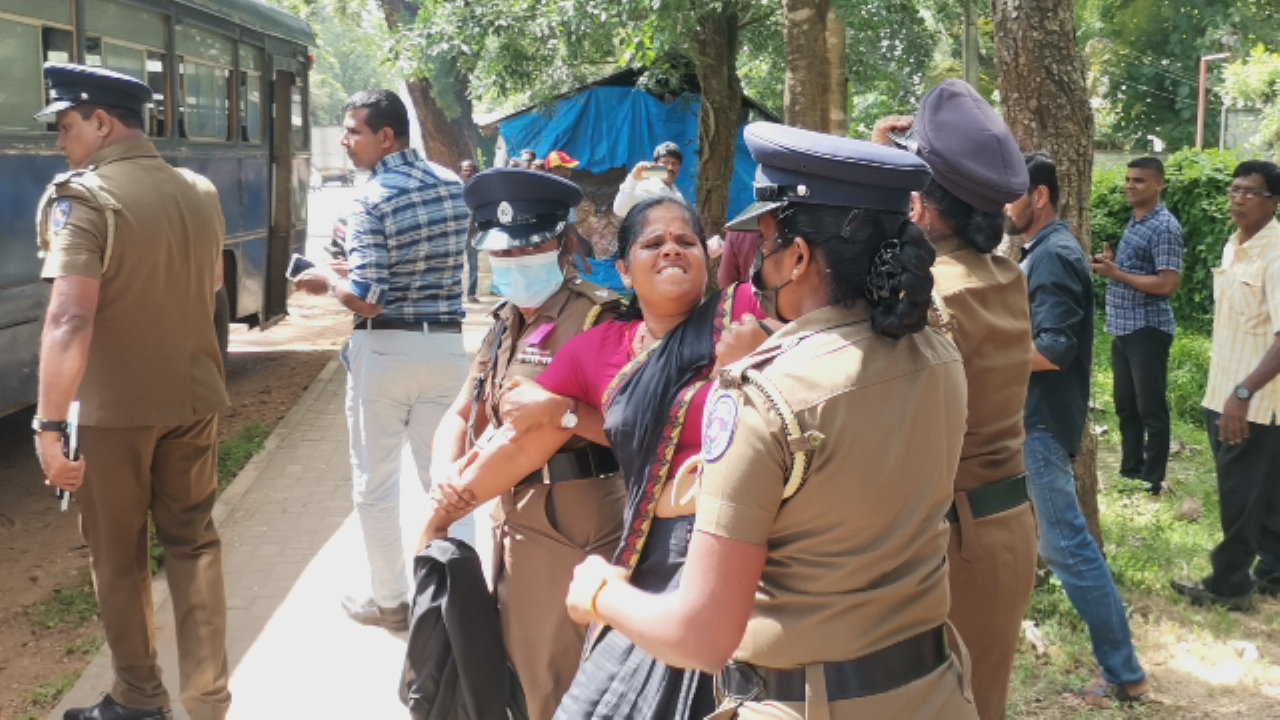
February
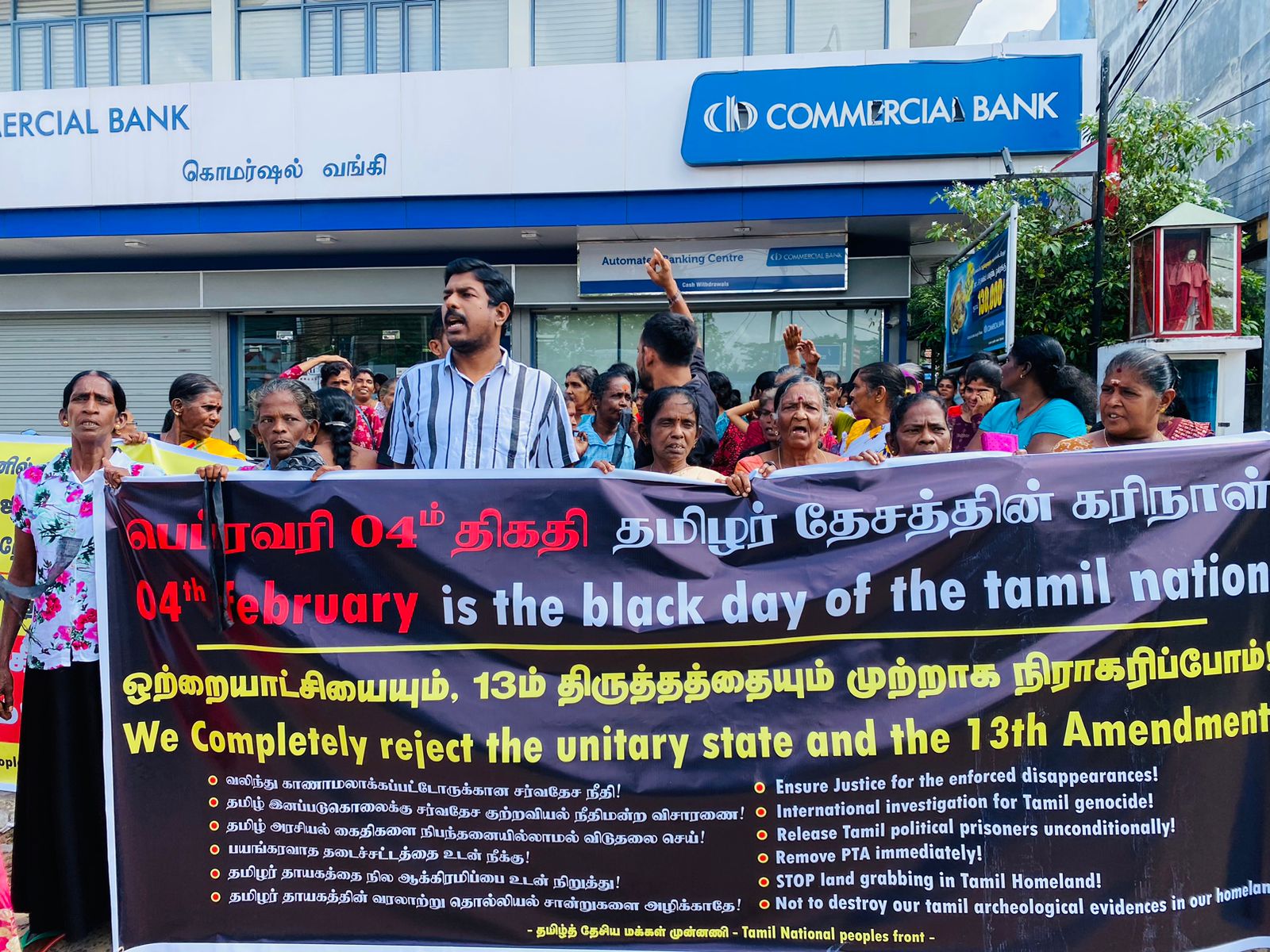
Tamils raised black flags across the North-East as Sri Lanka celebrated its 76th Independence Day. Since independence from Britain, Tamils have rejected the day as it serves as a reminder of Sinhala Buddhist oppression. As part of the protests, University of Jaffna students marched from Jaffna to Kilinochchi but were met with a heavy security presence complete with barricades and riot police, armed with shields, batons, tear gas and water cannons.
February also saw Tamil families of the disappeared mark seven years of continuous protests demanding to know the fate of their forcibly disappeared relatives. In Kilinochchi, Tamil families rallied through the town and reached Kilinochchi Kandaswamy Kovil, where their first protest began in February 2017.
March
The United Nations Human Rights Council convened its 55th session where the UN High Commissioner, Volker Turk, stressed that Sri Lanka must address the “root causes” of the conflict to see “genuine reconciliation and sustainable peace and development”. In his address to the Council, Turk highlighted that the “violations of human rights remain unaddressed” and called on member states to use universal jurisdiction and targeted sanctions against Sri Lankan officials credibly accused of human rights abuses.
Sri Lanka, however, continued to reject an external evidence gathering mechanism which was mandated in Resolution 46/1 to collect, consolidate, analyse and preserve evidence that may be used in future war crimes trials.
Whilst the UNHRC continued to discuss Sri Lanka’s human rights situation in Geneva, Sri Lankan police officers unleashed violence on Tamil worshippers who were observing Shivarathri at the Vedukkunaari Hill Athi Sivan temple in Vavuniya North. Eight worshippers, including former TNPF MP Selvarajah Kajendren were manhandled and arrested. The arrests took place after Sinhala Buddhist monks appealed to Sri Lankan police to halt the festival from being celebrated at the temple. A mass protest was launched in Nedunkerny, Vavuniya.
Vedukkunaari Hill Athi Sivan temple has been a place of worship for Tamil people for generations but has recently been declared as an ancient Buddhist site by Sri Lanka’s archeology department. Similar tactics have been used by the state to colonise other traditionally Tamil and Muslim sites across the North-East.
April
In April, Tamil livestock farmers in Mayilathamadu and Madhavani, Batticaloa marked 200 days of continuous protest against state-sponsored Sinhala settler violence. The farmers launched their protest highlighting their suffering caused by the violence encroachment by Sinhalese settlers on grazing lands traditionally used by Tamil farmers.
April saw the unearthing of yet another mass grave in Tamil Eelam. This time, several human skeletal remains were found in Muhamalai, alongside uniform that is alleged to have belonged to an LTTE cadre. Whilst many mass graves have been unearthed in the North-East over the years, Sri Lanka has failed to meaningfully investigate them and provide any accountability.
Read more here: EDITORIAL - Unearthing mass graves
In April Tamil Guardian also interviewed award-winning Tamil folk rock band 9 Grader Nord. We spoke about their music; life in Norway as second-generation Eelam Tamils; and for Eelam Tamils to find their own voice.
Read more here: Eelam Tamils artists win a Norwegian Grammy – Interview with 9 Grader Nord
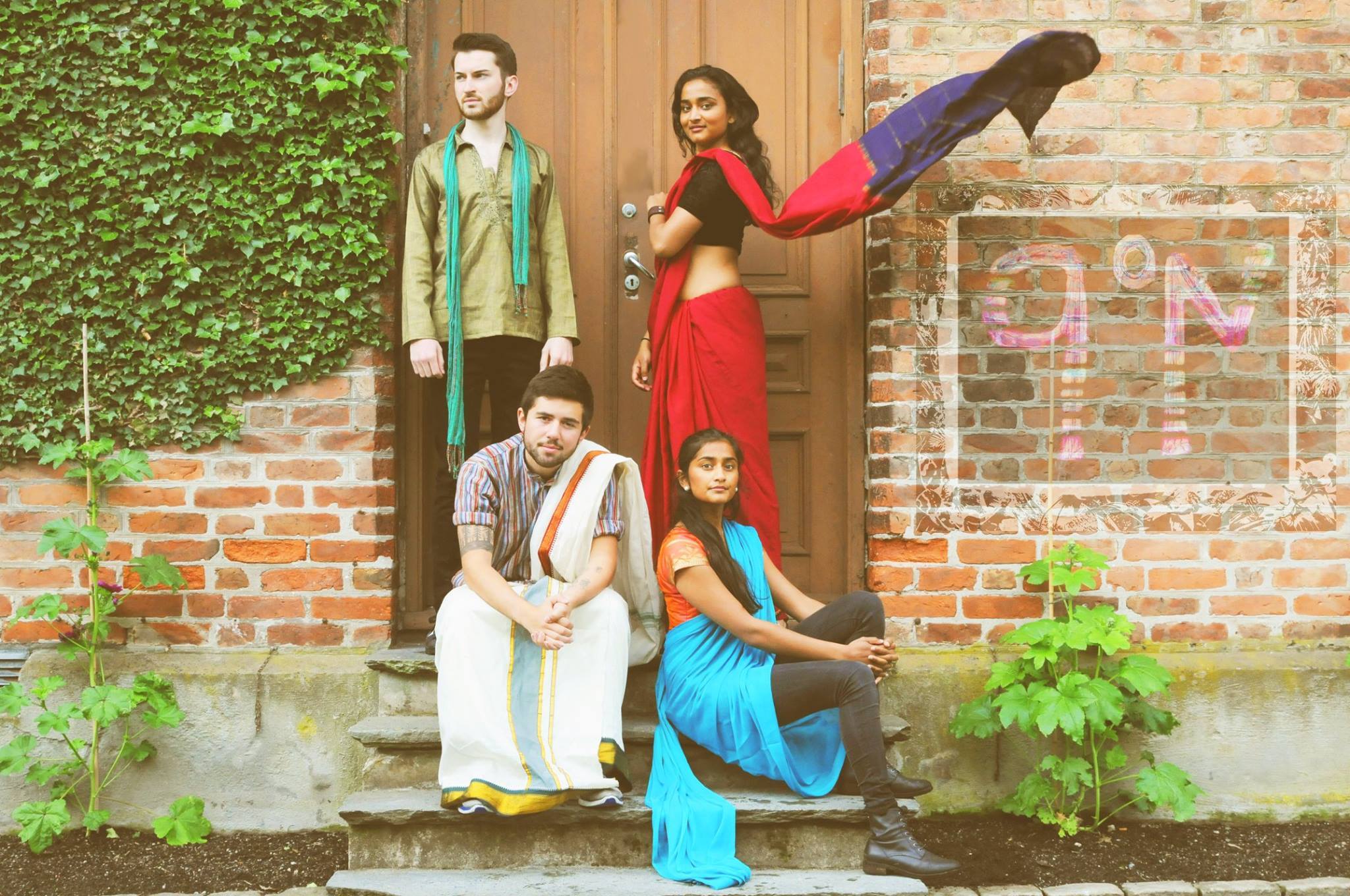
Tamil Guardian also sat down with Sunthar V to speak about Tamil identity and how it has been integral to his comedy, and to his audience.
Read more here: Proudly and fiercely Tamil' - An interview with Sunthar V
May
The month of May marked 15 years since the Tamil genocide at Mullivaikkal where an estimated 169,796 Tamils were killed by Sri Lanka’s military. The Sri Lankan government ordered Tamils to gather in ‘No Fire Zones’ where they were repeatedly shelled by Sri Lanka’s security forces.
To commemorate this dark period of the Tamil struggle, Tamils across the North-East participated in remembrance events despite attempts by the state to repress memorialisation activities.
Four Tamils were arrested just days before May 18, also known as Tamil Genocide Remembrance Day, for distributing kanji in Sampur, Trincomalee. Sri Lankan police officers arrested the four Tamils and dragged them from their homes after obtaining a court order from Muttur Magistrate Court which prohibited the distribution of Mullivaikkal Kanji and events commemorating the Tamil genocide.
Text of US resolution
In the USA, a landmark resolution was introduced to the US Congress calling on the United States to work towards an independence referendum for Eelam Tamils and recognise the genocide committed against them by the Sri Lankan state.
The resolution calls for the “nonrecurrence of past violence, including the Tamil Genocide, by supporting the right to self-determination of Eelam Tamil people and their call for an independence referendum for a lasting peaceful resolution”.
On May 18, thousands of Tamils gathered in Mullivaikkal where tens of thousands of Tamils were slaughtered at the hands of the Sri Lankan government. Amongst those in attendance was Agnes Callamard, Amnesty International’s Secretary General. Speaking to Tamil Guardian, Callamard called on the international community to take action by referring Sri Lankan to the United Nations Security Council with a view to an International Criminal Court investigation.
In May, Tamil Guardian spoke to Tamil gymnast and gold-medal winner, Shobhitha Gnanaratnasingham, as she reflected on her win.

Read more here: A Strengthening Resolve
June
Veteran Tamil politician Rajavarothiam Sampanthan passed away aged 91 in June. Sampanthan’s political career spanned six decades with his first stint in Sri Lankan parliament starting in 1977. He served as the leader of the now defunct Tamil National Alliance and remained as the MP for Trincomalee until his death.
June also saw the CONIFA's Women's World Cup open with a match between Tamil Eelam and Székely Land. The finals of the cup saw Tamil Eelam face Sapmi, the reigning champions, in a thrilling final which saw the Sapmi retain the trophy with a 2-1 win.
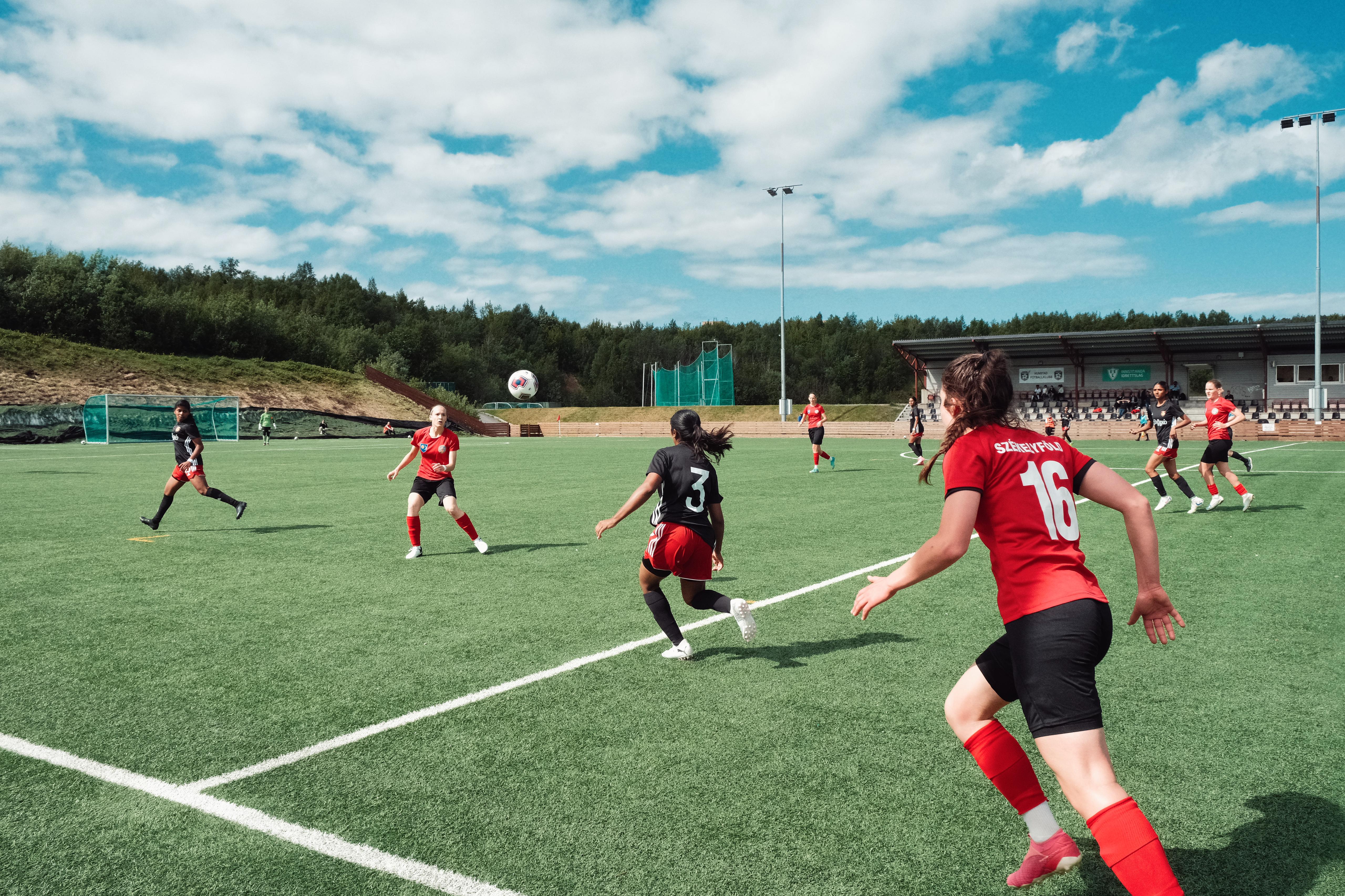
Read more here: OBITUARY - Rajavarothiam Sampanthan
July
In the UK, the British Labour party secured a landmark victory with a majority with 411 seats out of 650. The previous administration, under Gordon Brown, was in power during the Mullivaikkal genocide in which tens of thousands of Tamils were massacred during the onslaught by the Sri Lankan military.
Both Keir Starmer, and his Foreign Secretary, David Lammy, have voiced support for bringing Sri Lanka before the International Criminal Court to deliver justice for survivor communities. However, when pushed on this prior pledge in November, Lammy responded claiming that the government was working with the new administration to address these issues.
.jpg)
In July, Tamils also lined the streets of Paris to celebrate as Tamil baker Tharshan Selvarajah became the first Eelam Tamil to carry the Olympic torch ahead of the Paris Games.
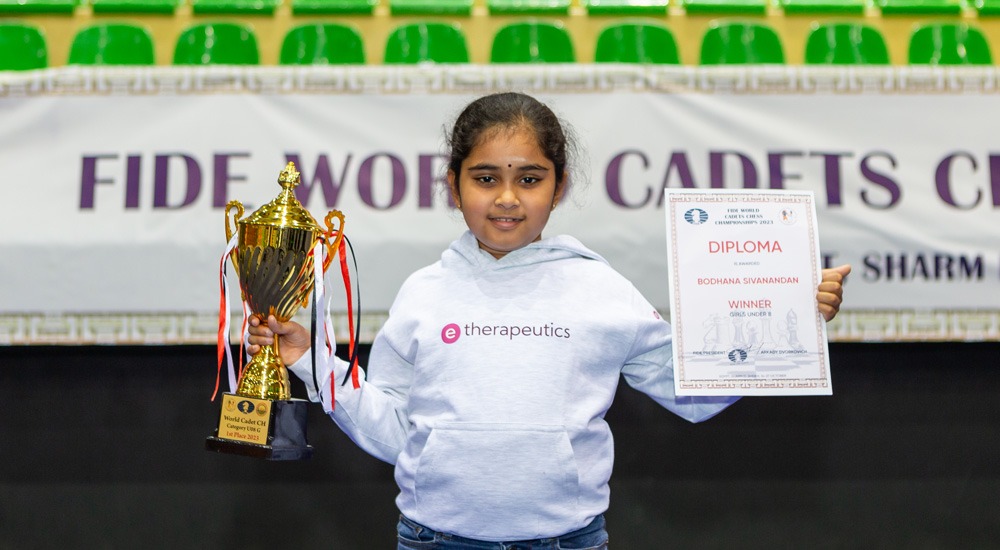
July also saw 9-year-old, Bodhana Sivanandan, from Harrow, north-west London, named as a player in the England Women's Team at the Chess Olympiad this year.
August - September
In the lead up to Sri Lanka’s presidential elections, which gave the public their first chance to directly elect a new leader since the Aragalaya protests of 2022, the island was a buzz with political activity.
In the Tamil North-East, political parties were split on which tactic to adopt. For the first time, a collective of Tamil parties opted to field their own common candidate to contest the elections as a sign of defiance against the dominance of Sinhala candidates. However, other established Tamil politicians, such as MA Sumanthiran, disputed the proposaland advocated on behalf of opposition leader Sajith Premadasa. The Tamil National People’s Front, rejected both tactics and maintained the need for Tamils to reject the election process entirely and boycott the elections.
Meanwhile in the South, the previously dominant SLFP, fielded the Rajapaksa prodigy, Namal Rajapaksa, who has been accused of involvement in a high-profile murder in Colombo. Whilst the National People’s Party (NPP), viewed as a political outsider was making significant strides in a message of rooting out corruption.
The election saw a landmark victory for the “marxist” NPP leader Anura Kumara Dissanayake. However, the election also witnessed the disintegration of the dominant Tamil National Alliance following the death of their party stalwart Sampanthan and continued infighting which plagued ITAK. The erosion of faith in these established Tamil voices has been long-standing but the election provided for an explosion of Tamil nationalist voices. In Jaffna and Vanni alone, more than 800 candidates from hundreds of political parties are standing for just 12 seats. In the East, more than 1,200 candidates are vying for their 16 seats. Despite an array of candidates running, almost all of them have similar stances when it comes to pledges of justice, accountability, and self-determination—core pillars of Tamil nationalism.
In September, Paralympic athlete Rigivan Ganeshamoorthy won gold in Paris, in an unforgettable night where he smashed the world record for the F52 discus throw three times on his way to victory.
October
The Sri Lankan state apparatus still continued to facilitate land grabs attempts and the illegal construction of Buddhist Viharas across the North-East. This was met with Tamil civil resistance. Tamil residents successfully blocked government officials from surveying land for a Sri Lankan Navy Camp in Mandaitivu. The navy has been occupying the Mandaitivu since 1990 with its camp based on over 18 acres of land belonging to 11 Tamil owners.Various Sri Lankan government departments, such as the archeology department, have tried to acquire lands owned by Tamil people. Similarly Tamil residents from Thaiyiddy led protests against the illegal construction of a Buddisht Vihara on land occupied by the Sri Lankan Army.
In October, Vashanth Selvadurai, an Eelam Tamil who fled to Denmark during the armed conflict was honored with the Danish National Award in Education, marking the first time a Tamil individual has received this prestigious recognition.

Australian Tamil footballer Nishan Velupillay also made a stunning international debut for Australia during their 2026 FIFA World Cup Qualifier match against China, as he bagged a goal in his first international match.
This month also saw Jaffna’s own 29-year-old Satkunarasa Pushanthan achieved an outstanding feat at the Commonwealth Powerlifting Championship 2024, winning an overall silver medal at the international competition.
November
Dozens of Eelam Tamils who had been unlawfully detained on Diego Garcia for more than three years in “abhorrent conditions” were offered a move to the United Kingdom. The group of 64 Tamils, including 16 children, who had fled persecution in Sri Lanka were being held in the British Indian Ocean Territory (BIOT). For three years campaigners fought against their extradition back to Sri Lanka where they would face persecution and harassment from Sri Lankan military personnel. As Tamils still continue to flee the island, some following their participation in peaceful protest marches. Sri Lanka still continues to militarise the North-East creating a climate of fear across the Tamil homeland.
November also saw a landmark victory for the “marxist” NPP leader Anura Kumara Dissanayake during the parliamentary elections. However, the same election also witnessed the disintegration of the dominant Tamil National Alliance following the death of their party stalwart Sampanthan and continued infighting which plagued ITAK. The erosion of faith in these established Tamil voices has been long-standing but the election provided for an explosion of Tamil nationalist voices. In Jaffna and Vanni alone, more than 800 candidates from hundreds of political parties are standing for just 12 seats. In the East, more than 1,200 candidates are vying for their 16 seats. Despite an array of candidates running, almost all of them have similar stances when it comes to pledges of justice, accountability, and self-determination—core pillars of Tamil nationalism.
Read more here:
EDITORIAL - The end of Tamil nationalism? Not according to the numbers
That display of Tamil Nationalism was evident at Maaveerar Naal. Despite heavy flooding following the landfall of Cyclone Fengal which impacted almost 200,000 people across the North-East. Thousands still came out across the Tamil Homeland to commemorate their war dead.Despite the heavy wind, rains and flooding, thousands of people came out to public commemorations held at the cemeteries that once housed the bodies of thousands of fighters. The cemeteries have been destroyed by the Sri Lankan government, with some now having military bases built on top of them.
December
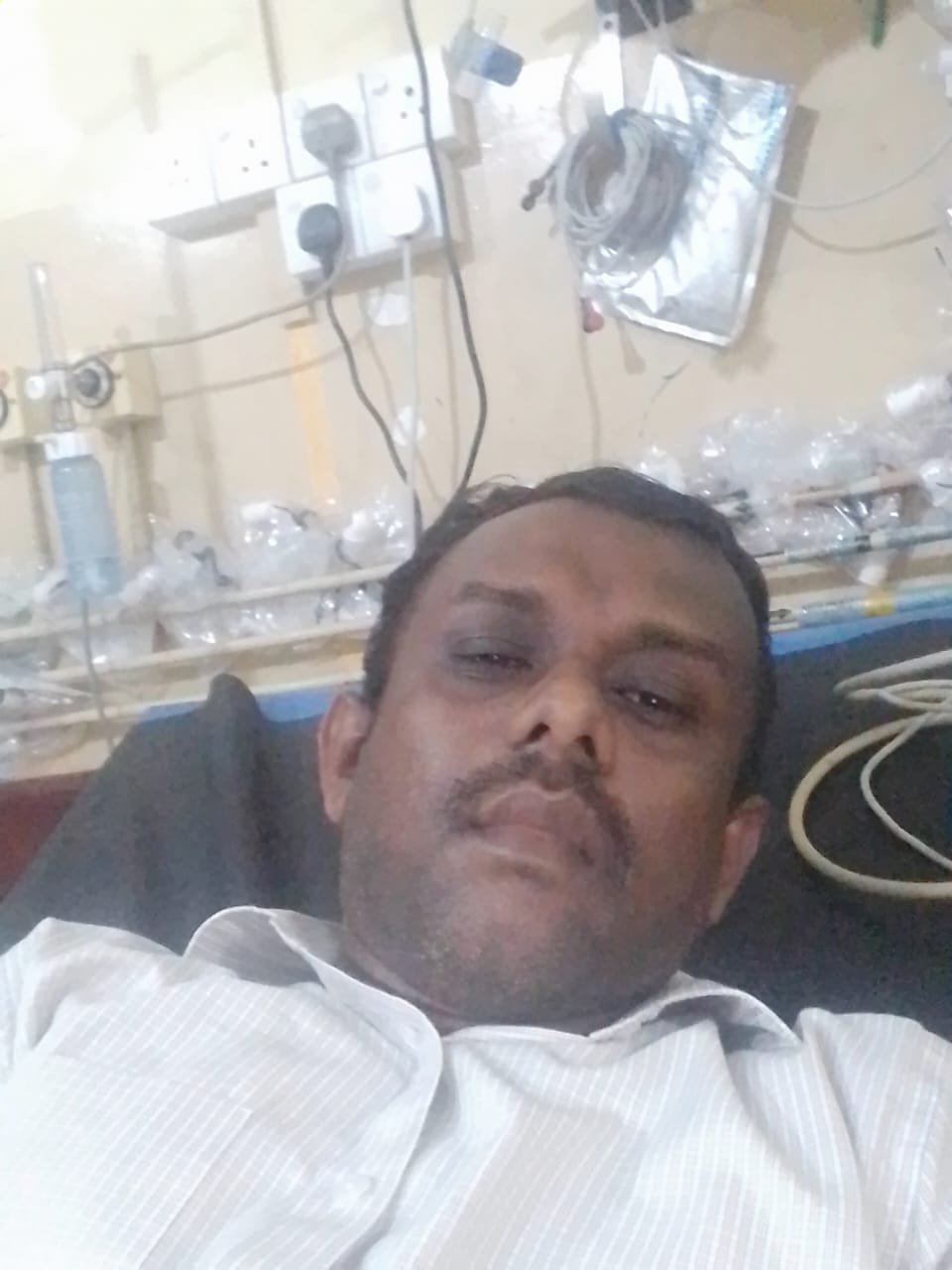
As the year came to end, sadly Tamil journalists continued to come under attack. On boxing day, Tamil journalist and writer Murugaiyah Thamilselvan was attacked on the A9 road in Kilinochchi town at around 5.30 p.m by unknown assailants. He was narrowly able to avoid being kidnapped.
Despite this, Tamils continue to preserver. This week has seen Tamil families of the disappeared protested in Jaffna and renew their calls for an international investigations into the enforced disappearances of their loved ones.
"We cannot spend our entire lives searching for the disappeared. The international community should provide us with justice," the families chanted.

.jfif)